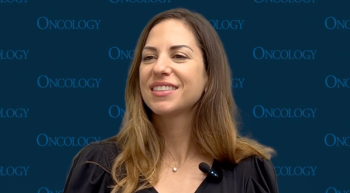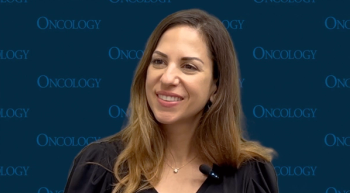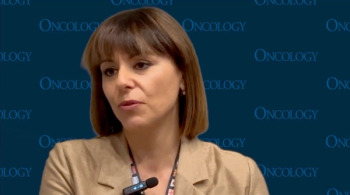
- ONCOLOGY Vol 16 No 4
- Volume 16
- Issue 4
First Radioimmunotherapy Approved by FDA
The US Food and Drug Administration (FDA) has approved ibritumomab tiuxetan (Zevalin) for the treatment of relapsed or refractory low-grade, follicular, or transformed B-cell non-Hodgkin’s lymphoma (NHL), including rituximab (Rituxan)-refractory disease.
The US Food and Drug Administration (FDA)has approved ibritumomab tiuxetan (Zevalin) for the treatment of relapsed orrefractory low-grade, follicular, or transformed B-cell non-Hodgkin’s lymphoma(NHL), including rituximab (Rituxan)-refractory disease. A monoclonal antibodylinked to a radioisotope, ibritumomab tiuxetan targets the CD20 antigen on thesurface of mature B cells and B-cell tumors, inducing cellular damage inthe target and neighboring cells. The regimen is administered in two parts:Patients first receive rituximab followed by indium-111-ibritumomab tiuxetanfor screening purposes. If tumors are successfully targeted with this procedure,7 to 9 days later patients receive another infusion of rituximab with yttrium-90-ibritumomabtiuxetan.
Efficacy Data
The FDA approval was based on two major efficacy studiesconducted in the United States. Determination of the effectiveness of theibritumomab tiuxetan regimen in a relapsed or refractory patient population wasbased on overall response rates. The effects of the regimen on survival are notknown.
The first study was conducted in 54 patients with relapsedfollicular lymphoma who no longer responded adequately to rituximab. An overallresponse rate of 74% was reported, with 15% achieving a complete remission,according to the International Workshop Response Criteria. The second study, aphase III randomized, controlled trial, was conducted in 143 patients withrelapsed or refractory, low-grade or follicular NHL, or transformed B-cell NHL.The overall response rate for the 73 patients who received the ibritumomabtiuxetan regimen was 80%, compared to 56% for the 70 patients who receivedrituximab alone. Among patients in the ibritumomab tiuxetan group, 30% achieveda complete remission and 4% an unconfirmed complete remission, compared to 16%in the rituximab group with a complete remission and 4% with an unconfirmedcomplete remission.
Adverse Reactions
In safety data based on 349 patients, the most serious adversereactions to the ibritumomab tiuxetan regimen included severe infusion reactions(hypotension, angioedema, hypoxia, or bronchospasm) and severe and prolongedcytopenias including thrombocytopenia (61% of patients with platelet counts< 50,000 cells/µL) and neutropenia (57% of patients with absoluteneutrophil counts < 1,000 cells/µL) in patients with 150,000 platelets/µLor higher prior to treatment. Severe infections (predominantly bacterial in origin) andhemorrhage, including fatal cerebral hemorrhage, have occurred in a minority ofpatients in clinical studies.
In addition, myeloid malignancies and dyscrasias(myelodysplastic syndrome) were seen. The most common toxicities reported wereneutropenia, thrombocytopenia, anemia, gastrointestinal symptoms, increasedcough, dyspnea, dizziness, arthralgia, anorexia, and ecchymosis. Hematologictoxicity was often severe and prolonged, whereas most nonhematologic toxicitywas mild.
"Zevalin represents a major advance in the treatment ofcertain non-Hodgkin’s lymphomas, especially among patients who have becomerefractory to other treatment options," said Thomas E. Witzig, MD, ahematologist at the Mayo Clinic, Rochester, Minnesota, and a key investigator in thetrials. "Zevalin is a significant step forward in managing patients withadequate bone marrow reserves who have failed standard chemotherapy, rituximabtherapy, or a combination of chemotherapy and Rituxan."
He added, "Unlike standard chemotherapy, which is givenover as many as 4 to 6 months, Zevalin can be administered in an outpatientsetting over 8 days with approximately 12 weeks of follow-up."
Articles in this issue
almost 24 years ago
Introduction to Irinotecan and Other Agents in Colorectal Cancer, Volume 1almost 24 years ago
Deputy Director Named for FDA’s Division of Oncology Drug Productsalmost 24 years ago
InTouch and ASCO Announce New Cancer Information Featurealmost 24 years ago
Optimized Strategy for Lymph Node Analysis Studiedalmost 24 years ago
Major Cancer Bill Introduced in Senatealmost 24 years ago
FDA Approves Zoledronic Acid for Cancer-Related Bone Complicationsalmost 24 years ago
Recurrent Ovarian Cancer as Chronic Diseasealmost 24 years ago
Irinotecan Therapy for Small-Cell Lung CancerNewsletter
Stay up to date on recent advances in the multidisciplinary approach to cancer.



































